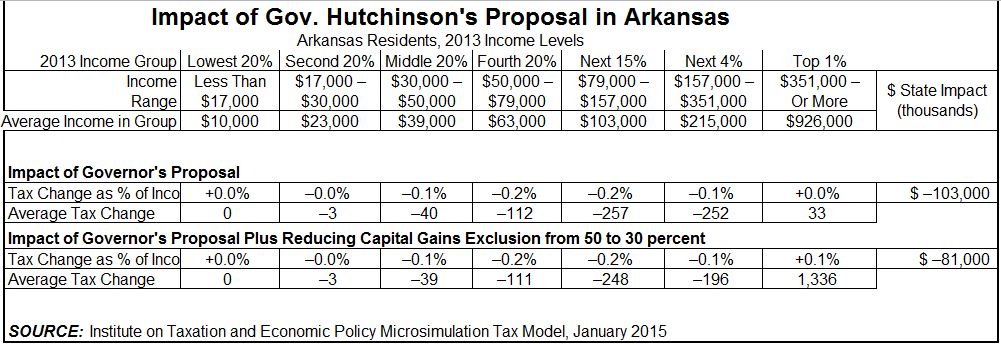
The governor’s new tax cut plan is a step in the right direction for tax fairness, but leaves out the poorest 20 percent of Arkansans and raises concerns about how the lost revenue will impact vital programs for children and families. Despite tax breaks targeted to the middle class, and even a hike for the very wealthy, the bottom 20 percent of Arkansas taxpayers will see no average change in the taxes they pay.
The proposal maintains some small marginal tax breaks for those at the bottom (who make less than about $17,000 a year) that were already passed in 2013, but there is nothing new in the bill that would help low-income Arkansans. Workers at the bottom of the ladder pay about twice the tax rate of the richest people in our state as a percentage of income, and have benefitted the least from the current economic recovery.
Arkansas ranked 11th worst in the county in overall tax fairness, according to a recent report by the Institute on Taxation and Economic Policy. So, it is good to see provisions in the new tax bill that give a needed break to middle income earners. Gov. Hutchinson’s plan deserves some praise. It is designed to give a break to those earning between $21,000 and $75,000 a year. So the middle 20 percent of taxpayers, those with incomes between $30,000 and $50,000, will receive an average tax cut of $39 under the proposal.
The bill also takes steps to reduce the unfair tax advantages for the wealthiest people in Arkansas by repealing the capital gains tax breaks passed last session. Capital gains, or money earned from the sale of investments like real estate or stock portfolios, are usually taxed at lower rates. The type of people who earn this kind of income are overwhelmingly high-income; a typical minimum wage worker doesn’t tend to have a stock portfolio or a series of rental houses. On average, repealing the capital gains tax cuts will increase taxes for the top 1 percent of Arkansas taxpayers (those who make over $351,000 a year) by an average of $1,336. As a percent of their income, these taxpayers have the lowest state and local tax burden of any income group, paying less than six percent of their income in taxes.
Low- and middle-income families need a fair tax structure, but they also rely on public services that require tax dollars. This new tax bill could reduce revenues enough to leave important services like pre-K high and dry in the coming years. We won’t know the exact impact this bill will have on the state budget until the Governor releases his proposed budget next week. We do know that it will result in the loss of $80.6 million in revenue by 2017. That’s $80.6 million less in services, staff, programs. No tax cut should be passed until the details of the Governor’s budget, and how he intends to pay for the tax cut, are released.
By law, Arkansas has to pass a balanced budget. This means we have to pay for the loss in revenue either by either slashing program budgets or by finding another way to raise the money. This revenue loss comes at a time when the state is already underfunding a range of critical programs that are important to the state’s economic future and to children and families: the state’s ABC pre-K program, community-based rehabilitation programs for juvenile offenders, child welfare case workers and investigators, poverty funding for low-income students, higher education, and improvements to infrastructure like highways and roads. Ideally, the legislature will offset this loss by raising new revenue through other parts of the Arkansas tax system, rather than relying on budget cuts or using one-time funds. But no plans to do so have been announced. AACF will issue a report on responsible revenue raising ideas for the Arkansas state budget in the coming days.
In several ways, this plan is a move toward a more equal and fair Arkansas. However, we should be cautious not to take one step forward and then two steps back. Legislators and advocates should be wary of “Gateway” tax cuts that could lead to bigger, more irresponsible cuts for the wealthy down the road. Other states, such as Kansas, have passed massive tax cuts that have nearly bankrupted the state budget. The tax cuts in Kansas also had disastrous effects on the state’s ability to provide critical services and have done nothing to improve the state’s economy as proponents of the tax cuts originally predicted.

